

Growing Roots
Alex Sakamoto
Growing Roots


Dedication

For Charmaine Turbow, one of the most creative, hilarious, and hardworking people I know. Thank you for letting me barge into your home at the crack of dawn and the ever-constant stream of texts I bombarded you with. I have never met anyone with such patience and heart for what they do. I hope your impact continues for generations to come.



Acknowledgments

Special thanks to all who have made this production possible for their endless support and light they bring to the world. Thank you to my teachers at Freestyle Academy for giving me the tools and opportunity to create this work. Thank you to Marie Clifton, the nicest, most caring soul I was blessed to meet.


Table of Contents
Dedication - 3
Acknowledgments - 5
Preface - 9
Introduction - 13
Chapter One - 17
Chapter Two - 21
Chapter Three - 27
Conclusion - 31
Works Cited - 33
About the Author - 35






Preface
When hit with the Documentary project at Freestyle I struggled to find a genuine, meaningful topic to write about. It was a whole other feat to think of a person willing to help me with this ordeal until I came home to a grand assortment of flowers coloring the kitchen counter. There was no label, no identifiers, and no way to know who it was from. All I knew was the smile that grew on my face upon seeing the bouquet, planting the seeds of an idea yet to come to fruition. If there was anyone worth telling the world about, it would be someone who would spontaneously give flowers to their friends, someone who dedicated their life to helping others, and most of all, someone who sparks joy in others.
I had first heard of Turbow Farms in the Fall of 2022 where they had generously donated flourishing bouquets to the MVHS Senior Night. Each bundle was delicately wrapped with brown paper and a single sticker adorned with the Turbow Farms logo. After the ceremony, I had asked my Mom where we had bought them from. She simply responded, “Charmaine gave them to us! Aren’t they pretty?” Surely assortments of that caliber weren’t for free. Especially not for a celebration at a school where her own kids don’t attend. “Nope! She refused to let us pay,” Mom answered.
Later that same year, my Grandpa had suffered an injury
that caused my Mom to balance his intensive recovery with her own schedules of work, kids, and countless other events. Even then, Charmaine delivered another bouquet to lift the spirits of everyone in the now crowded house. During its life, I saw my Grandma sniffing the blooms, occasionally taking her favorite flower out to keep by her side. I saw my Mom smile every time she had the time to glance at the decor.
Fast-forward to today, my grandparents’ newly redone backyard features blooms handpicked by Charmaine and my Mom. Whenever we drop by to visit, there never fails to be a small glass filled with my Grandma’s pick of the week. One by the kitchen windowsill where she cooks her favorite Korean dishes, and one by the chair where my Grandpa seems to never leave. Such a small gesture of kindness rippled outwards towards everyone in my family.
In this process I was able to ask why Charmaine donated those initial bouquets. She looked at me astounded, “Of course! If your Mother asked me to jump, I will jump.” So, from the bottom of my heart, thank you Charmaine for showing me what it means to be a good friend and what you do for your community.

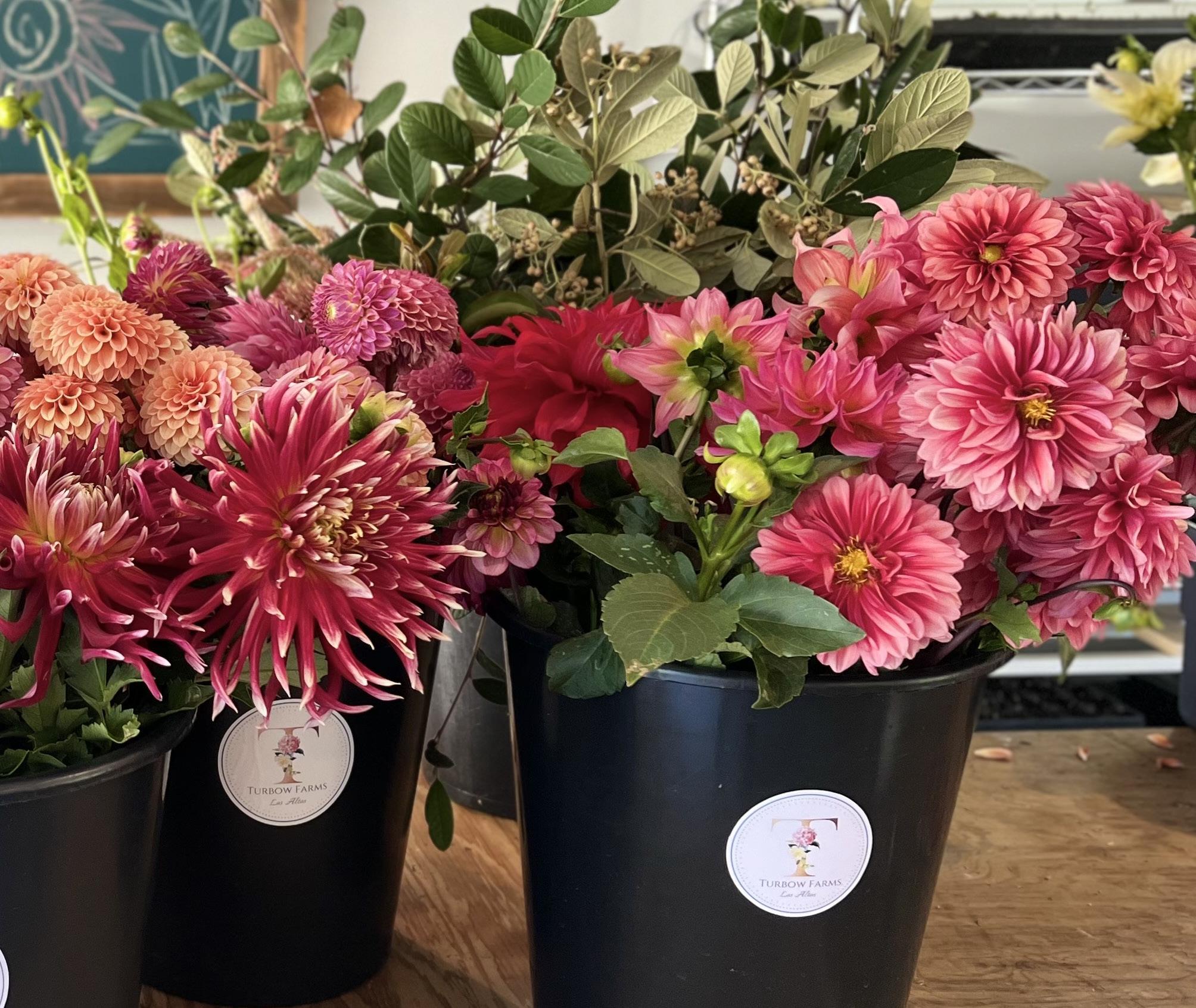

Introduction
In the heart of tech, there lives a garden that grows a spectrum of flowers of every shape and color. Glowing pink dahlias spring out of the bushes and equally vibrant blooms of variegated petals creep out into the cozy space. Countless blossom varieties are grown from the dry earth beneath. Looking into the nursery of flowers, it’s as if one had walked into a rainbow of riches. Each flower represents hours of love and care required to grow from the soil of Los Altos Hills. From the climbing windows of the estate, the view is littered with bursts of color that speckle the grounds. At the center of it all lies Charmaine Turbow, the Head Farmette of Turbow Farms — practicing chiropractor, mother, and wife.
She, much like the flowers she cultivates, draws you to escape the real world with her charming personality and razor-sharp wit. From the early mornings into the late afternoons, Charmaine lovingly tends to her plot with occasional help with her family of five. Her
hair, dark and rich as the soil she nurtures, is often seen in an up-do that slowly transforms into a low bun throughout the workday. Sporting a handmade Turbow Farms hoodie and signature green leggings, she begins her harvest as the doors to jam-packed office buildings creak open just 15 minutes away.

Today, especially in Silicon Valley, the addiction to screens and constant, competitive work culture plague thousands. There is hardly a place that doesn’t possess a screen. This hustle culture is centered around maximizing productivity, ignoring the resulting stress and burnout that isolates workers, and perpetuates a sense of constant competition. Turbow notes the similarities to the chronic pain her chiropractic patients experience, with the stress of constantly trying to hustle in the workplace:
“We all kind of grin and bear it and our bodies have just gotten used to accommodating the pain and just moving forward and moving on…”
In contrast to this sanitized environment

that seems to be taking a toll on our health, Turbow’s micro farm challenges the industry giants that surround her through her community-centered events that promote togetherness and relaxation. She has created an escape of sorts from typical workplace, allowing participants to relax and reset from their stressful lives. At Turbow Farms, all one needs to worry about is tending to the garden — nourishing the plant life, and in return, nourishing themselves. She explains that, similar to her chiropractic practice, that her farm serves the same purpose of reinvigorating oneself. Turbow explains, “Like when people come here, it’s like they have a little transformation in who they are.”
At its surface, the bouquets are simply a combination of dirt, nutrients, soil, and other organic matter. However, like most things in her life, Turbow pushes others to look beyond. Her flowers are a culmination of unique varieties just like the people she helps bring together. Her assortments represent each and every individual not as a singular person, but as a blend of the people, events, and memories that have shaped them. To her, Turbow Farms represents healing and a sense of comradery of all who came before us, and all who will come in the future — the seeds of what will soon become a beautiful community garden.






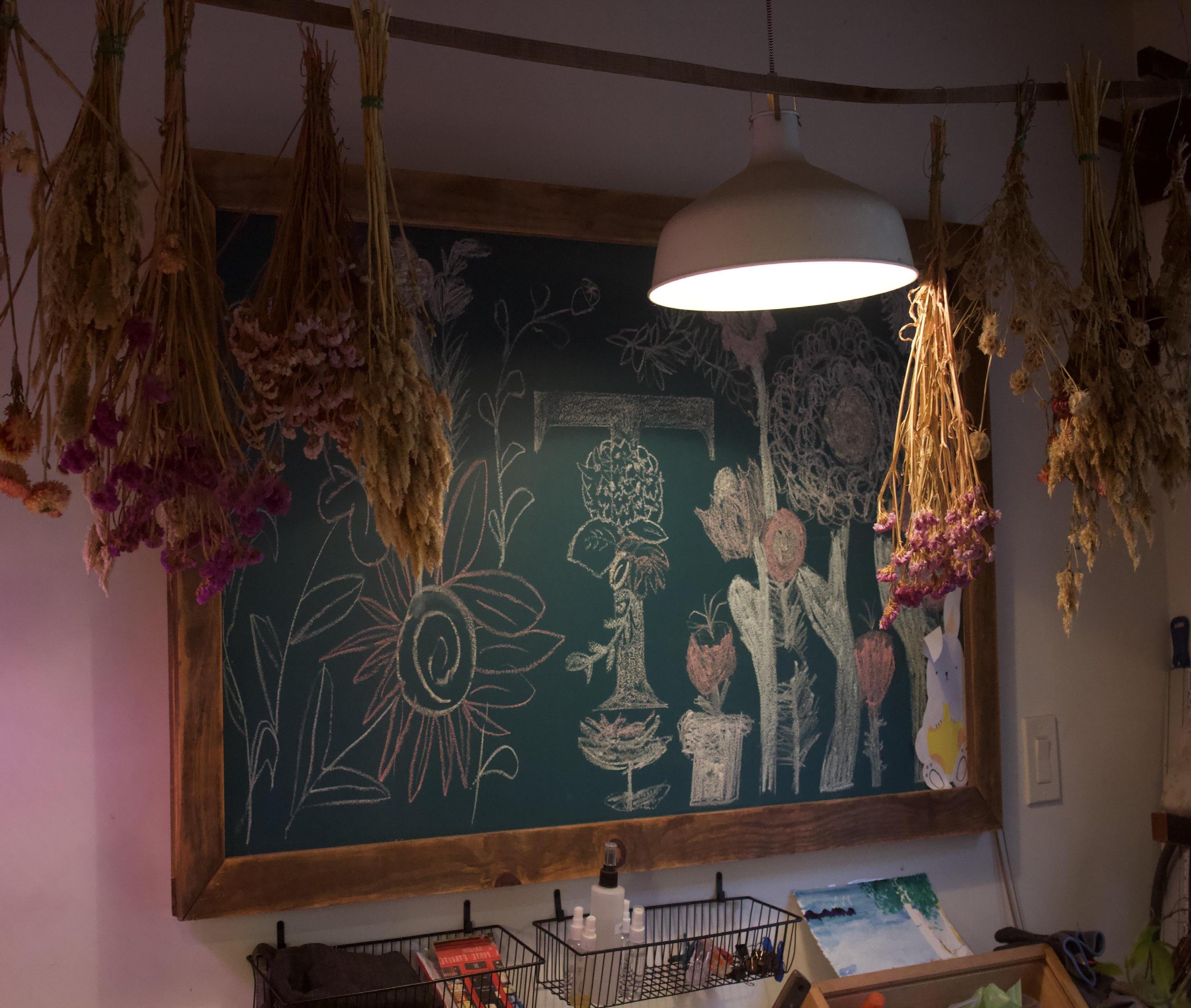
Chapter One
Professionally, Turbow began as a chiropractor at a local practice for over 20 years. The medical field, much like the corporate jobs in the Bay Area, tend to have a rigorous work culture and schedule that often burns out their employees. However, it wasn’t until the tragic death of her best friend and her mother-in-law until she first planted the seeds of what would become Tubow Farms. The unthinkable void left by the loss of 13 years of friendship and prominent maternal figure in her life crushed Turbow’s heart. Everyone in her tight-knit family felt the weight of these losses, and with it, a new perspective on how to live life to the fullest. Her husband’s second cousin, in particular, was integral to forming Turbow’s out-of-the-box outlook on life and how it should be spent. Charmaine recalls his inspirational words, reminding her of her own role as a mother, guardian, and protector: “So what you’re going to do is spend time with your kids. You’re going to do things with your kids that matter.’” With newfound mo -

tivation and dedication to create a space that would emulate just that environment, Turbow, her husband, Dan, and children began to cultivate what was to become Turbow Farms. With only an acre of land and drought-stricken soil, the Turbow family began to create a whirlwind of unique, specialty-cut flowers that attracted attention from far and wide. Living in the headquarters of technology, Turbow’s decision to pivot towards farm life certainly turned heads. Though extremely proud of her business and what it has accomplished, she recalls the fear of judgment and offhanded looks of other parents in the school pick-up line, “It wasn’t easy to tell people we had a farm. I was actually really embarrassed.” Due to Silicon Valley’s emphasis on all things STEM, many people do not hold respect for time, effort, and labor that is not related to the discipline. However, this did not deter Turbow — she understood that there was meaning in the work she was beginning to do, and that whether or not people “respected” her choice to cultivate a farm did

not devalue her labor. Despite hardships and uncertainties, she persevered forward towards actualizing her dream.

going to do things with your kids

From her own healing journey, Turbow invites others to become part of a community that is there to support and uplift one another, just as she had in a time of need. Through hosting team-building events — held in-house— Turbow seeks to allow individuals to decompress, opening themselves to unlock creative freedom, as well as granting access to a larger community of connection. Her goal: to break up the machine-like monotony and grow a place where people come to escape. She further elaborates, “One of the big things for me was to get people grounded again. It’s not just cutting flowers or designing” (Turbow).

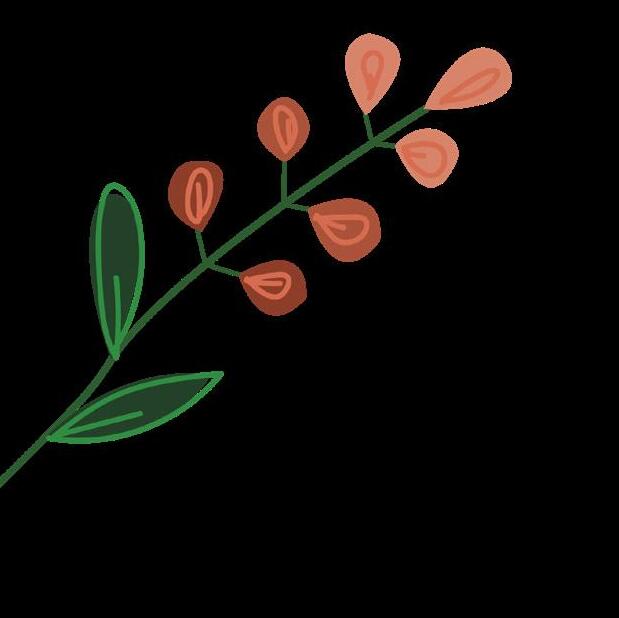


Chapter Two
The infamous work culture and stress that has come to be synonymous with Silicon Valley is not without reason. This clustering of tech giants have championed a corporate model that aims to blend work and personal life alongside generous pay, flooding their buildings with talent and other hopeful hires. Allured by the promise of a sustainable work-life balance with generous pay, this model was quickly popularized across Santa Clara county. However, this bred a highly competitive environment that sacrificed factors like job security and quality health insurance (Lyons). Additionally, “Stack ranking”, a practice that ranks the performance of employees against the whole workforce, have been reported in large companies like Amazon and Meta (Rawlinson). Although these companies are wildly successful in the eye of the public, this is not remotely reflective of what their employees feel. Stack ranking tends to foster a culture that centers around isolation instead of community. It attempts to motivate workers to boost their performance, placing emphasis and positive reinforcement on hard work and gainful results.
Despite this intention, stack ranking tends to pit workers against one another, dissolving any sense of cooperation or collaboration in the workplace, and leading to unfulfilled and a stressed out workforce (Lyons). The cyclical nature of capitalism often seems impossible to escape. In fact, the US Department of Labor states that roughly 65% of US workers classify work as a significant source of stress (OSHA) .
Turbow, through her workshops, aims to alleviate this corporate-induced stress to constantly overwork, while fostering that sense of togetherness and connection that is so glaringly absent in the workplace. Green spaces, areas generally reserved for plant life in urban cities, have been linked to being critical parts of human development and public health in general (Roy). Increased interaction with such spaces has proven beneficial, positive effects on mental health and overall wellbeing.



These areas have also been described as potential buffers against stressors such as job insecurity, heavy workload, long hours, and various other demands (Lee et al). Much like watering her seedlings and sprouting plants, Turbow enjoys nurturing the creative sides of those who visit her farm, hoping that they will together reap the benefits of increased mental and physical health in the process.
Last November, a team of about 40 CISCO employees booked one of Turbow Farm’s workshops as a team-bonding event. Once they arrived at the farm, it was clear to Turbow that this was a group filled with “type-A’s,” who are highly proactive individuals that struggle to relax. Nevertheless, they all expressed interest at the idea of trying something new (and admittedly, not related to their actual employment). Through these workshops, Turbow aims not to completely overhaul the meticulous nature of these people, but rather give them space to freely express themselves. She instructs them to simply “set that (their emotional baggage, their anxieties) all aside and let go,” an objective that is often easier said than done. Using hand-picked varieties of flowers and greens, beautiful and unique creations come to fruition from each person’s arrangements.
Throughout the process, the group is given a tour of the farm, provided snacks, and encouraged to go outside of their comfort zone. From this small escape cultivated by Turbow, connection sprouts both during and after their visit. There is a newfound sense of accomplishment, teamwork, and joy that is achieved through this unique experience with nature.
“A
lot of them come in very uncertain but by the time they leave, they’re all smiling”

A lot of what keeps Turbow going is seeing the community that forms as these individuals begin to learn about their peers. She sees the small things — like when she gets complete strangers to share bits about themselves, when suddenly, another head excitedly pops up and shares something similar. In feedback emails, Turbow often finds that people will often reach out to others in the same group and compare notes about at-home care or how to build raised beds in their own garden. Even outside her farm, Turbow still creates a sense of community that uplifts every party involved. “People who are in these really, really high production-type jobs, they actually need this space,” Turbow recounts with pride, “ a lot of them come in very uncertain but by the time they leave, they’re all smiling.”




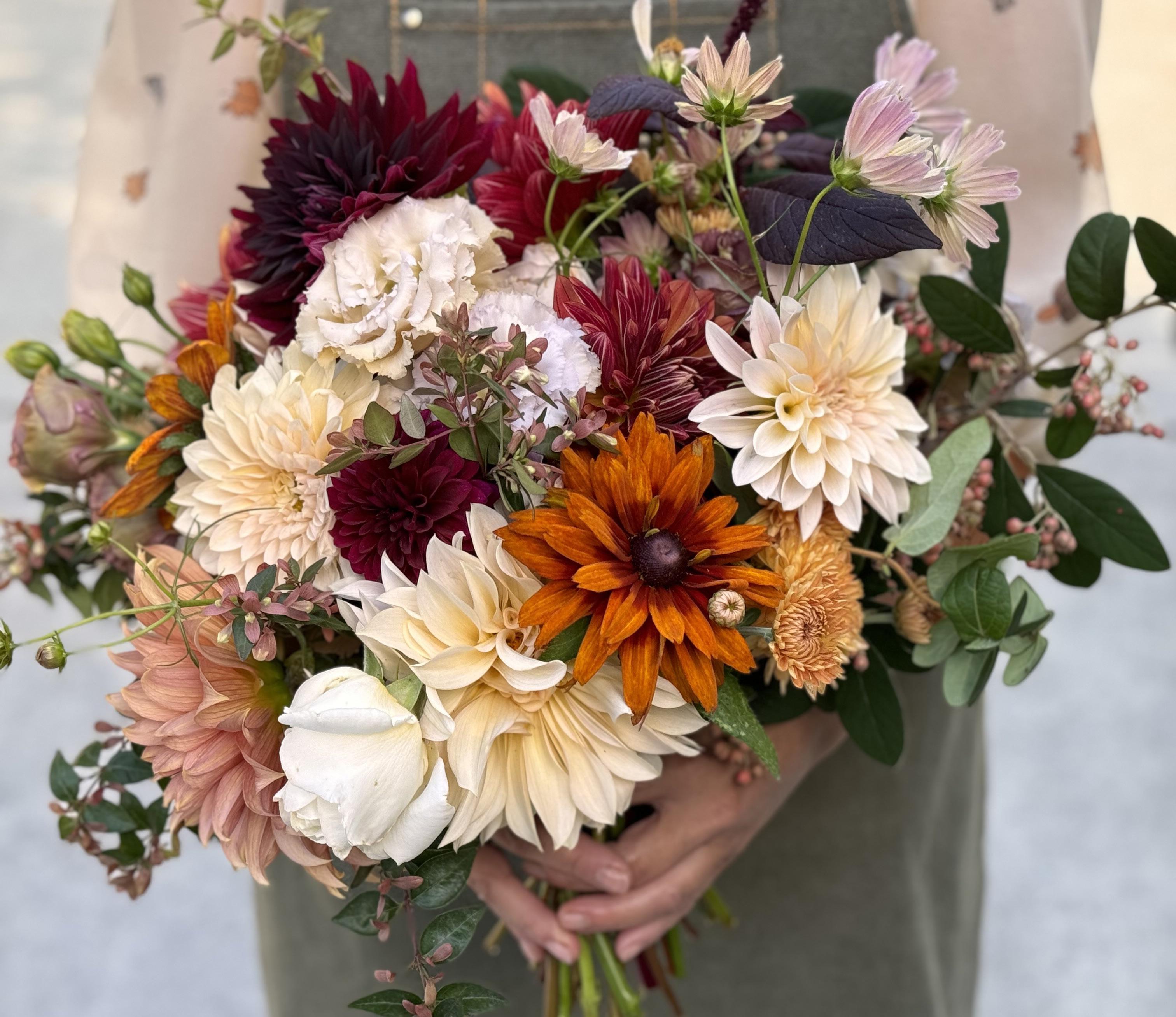

Chapter Three

Marie Clifton, a former psychologist at Amdahl Corporation (now Fujitsu Corp), volunteer at Turbow farms, and dear friend to Charmaine Turbow shares her experiences in the delicate art of balancing work and life. Clifton’s professional journey began at 11 years old and blossomed into creating health programs for company executives and employees. Later, she noticed an increase in mental and emotional health issues that led her to pursue her PhD in order to better help her patients.
She met Turbow after ordering flowers for pick-up online — upon arrival, Clifton was entranced by the oasis that is Turbow Farms. Of course, Turbow offered a tour of the property. Clifton, enamored with the concept behind its creation, asked “Can I

“She is definitely a grower. She can grow a community.”

volunteer here?” — a simple question that has since kick-started a lifelong friendship. Now, they meet together at the farm regularly, indulging in their tea tradition where Clifton and Turbow sit down, drink, and talk before tackling the plants. “Charmaine is such a fabulous teacher, not to mention she’s so fun to work with!” Clifton shares.
When Clifton felt unsure about her skills about flowers and gardening, she recalls Turbow offering a warm teaching hand. At the start, Clifton recounts the seedling trays being a source of worry. Clifton vividly remembers her anxiety surrounding the seeds sprouting under the grow lights then ensuring they take root into the ground where they will reside. Seeing this, Turbow reassured Clifton’s anxieties, reminding her that mother nature will decide what lives and what doesn’t, that it is impossible to control



“And so being able to help and individual, it’s a larger community. I’d be going like, ‘oh my God’, I can help her,’ the same way my interns everything, and to simply live in the moment. Clifton continues to help out on the farm, looking forward to their time together each week. “She is definitely a grower,” Clifton remarks excitedly, “she can grow a community, she brings people together…I think it’s beautiful, the legacy she brings…she really instills confidence in you”.

As a consumer and a propagator of Turbow’s vision of relaxation and grounding oneself in nature, she provides a glimpse into the effect that Turbow Farm’s philosophy has had on Clifton’s physical and mental health. More importantly, Clifton has also noted a more positive attitude change in her everyday temperament. Through volunteering in Turbow Farms, Clifton feels more empowered and in charge of her own body and actions — like the other flowers under Turbow’s care, Clifton has similarly blossomed into a happier and healthier person. Translating this outwards, Clifton is more mindful of the people in her periphery, wondering how she can help make someone, anyone’s day better. “And so being able to help an individual, it’s a larger community. I’d be going like, ‘oh my God, I can help her.’ The exact way my interns helped me develop my programs years ago at the hospital.” With just one chance encounter with Turbow, Clifton has now found herself all the richer — she is now with a lifelong friendship, enjoying improved mental and physical health, and continues to be mindful of how to help out the people surrounding her life.


Conclusion
In the end, the value of Charmaine Turbow’s work is underlined in her ability to germinate true, meaningful connection between individuals that emerges into a community that is as healing and rejuvenating as the one that she had in a time of need. Marie Clifton, just one of the many that Turbow has affected, adds to the web of connection that Turbow Farms spins. In her shared tea tradition, in her volunteering, and in her actions, she reflects the values of what Turbow has created within her home. Certainly, Clifton is only one of many unique individuals that Turbow has touched with her farm, her workshops, and her nurturing guidance.
Today, Turbow continues her commitment to grow and nurture the community around her with blog posts, helpful online videos, and lively workshops. With family and friends by her side she works to “create a magical space for people to come and escape to,” (Turbow). Though boxed in by the tech-dominated world nearby, Turbow remains dedicated to her philosophy of helping and healing others through her humor, flowers, and mindset. From seed to sprouting plant, she contin-
ues to tend her flowers, which are unique and special as the people who walk through her doors.

“What’s really remarkable to me is that when people are feeling better,they are nicer to everyone else around them, right? They’re

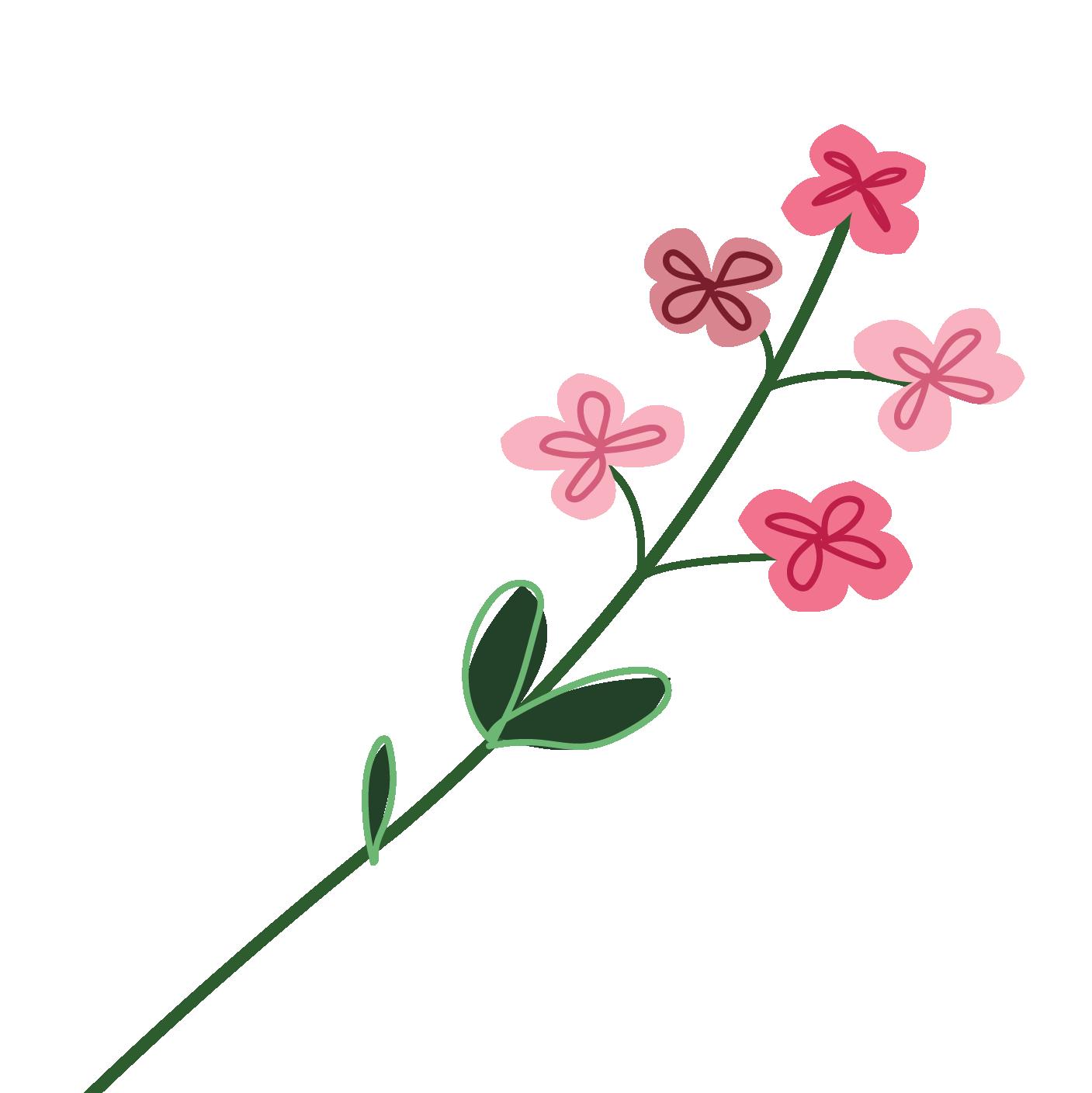


Works Cited
Clifton, Marie. Personal Interview, 4 Apr. 2024.
Lee, Andrew Chee Keng, et al. “Value of Urban Green Spaces in Promoting Healthy Living and Wellbeing: Prospects for Planning.” Risk Management and Healthcare Policy, U.S. National Library of Medicine, 27 Aug. 2015, www.ncbi.nlm.nih.go/pmc/articles /PMC4556255/.
Lyons, Dan. “How Silicon Valley Made Work More Stressful.” Knowledge at Wharton Podcast, Knowledge at Wharton, 13 Feb. 2019, https://knowledge.wharton.upenn.edu/podcast/ knowledge-at-wharton-podcast/silicon-valley-work-culture/.
Rawlinson, Nadia. “The Era of Happy Tech Workers Is Over.” The New York Times, The New York Times, 19 Jan. 2023,www.nytimes.com/2023/01/19/opinion/tech-layoffs-meta -amazon-silicon-valley.html.
Roy, Britteny, and Michelle LeBlanc. “Public Health and Green Spaces.” National Governors Association, National Governors Association, 2 June 2023, www.nga.org/news /commentary/public-health-and-green-spaces/.
Turbow, Charmaine. Personal Interview, 2 Feb. 2024.
“Workplace Stress - Overview.” Occupational Safety and Health Administration, Occupational Safety and Health Administration, (n.d.), https://www.osha.gov/workplace-stress.

About the Author



Alex Sakamoto is a Junior at Mountain View High School and design student at Freestyle Academy. She lives in Los Altos with her parents, older sibling, younger brother, and Noodle, her dog. She is part of the Varsity Volleyball team at Mountain View and continues to play on a club team. When not at school, she enjoys watching movies, rainy days, long drives with the windows down, and going out with friends.


